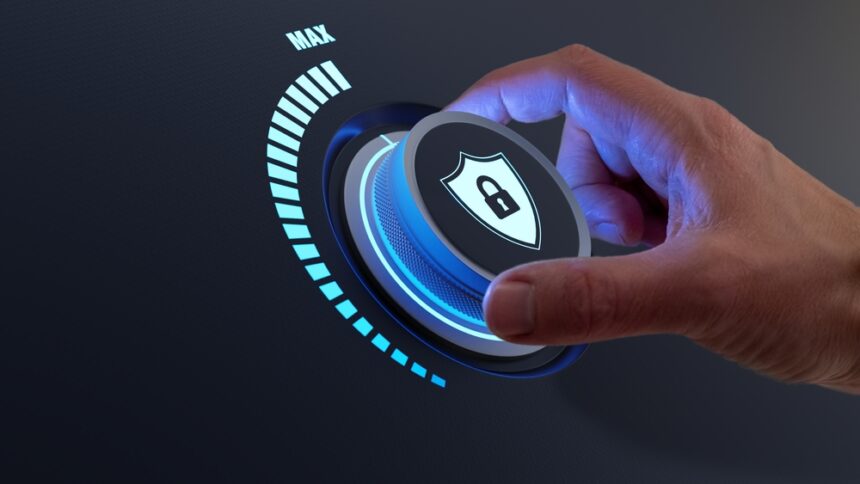AI poses a number of benefits and risks for modern businesses. One of the most striking examples is in the field of cybersecurity. One poll found that 56% of companies use AI to enhance their cybersecurity strategies.
A number of hackers are using AI to exploit their targets more easily. On the other hand, many cybersecurity professionals are also using AI to safeguard their digital assets.
AI technology is helping with cybersecurity in a myriad of ways.
Cybersecurity, often known as information security or IT security, keeps information on the internet and within computer systems and networks secure against unauthorized users. Cybersecurity is the practice of taking precautions to protect data privacy, security, and reliability from being compromised online.
The importance of AI-driven cybersecurity
Artificial Intelligence (AI) has revolutionized the field of cybersecurity, providing advanced tools and techniques to protect digital assets from an ever-evolving landscape of threats. The significance of AI in cybersecurity in today’s digital landscape, where information is increasingly being stored, transferred, and accessed digitally, cannot be understated. The threat of cyber-attacks is expanding across all industries, affecting government agencies, banks, hospitals, and enterprises. A successful breach can result in loss of money, a tarnished brand, risk of legal action, and exposure to private information. Cybersecurity aims to stop malicious activities from happening by preventing unauthorized access and reducing risks. In addition, cybersecurity protects companies’ intellectual property, trade secrets, and other private information, helping them to sustain a competitive edge and encourage creative problem-solving.
With persistent threats from state-sponsored espionage, hacktivist organizations, and cyber warfare, having an effective cybersecurity strategy has become increasingly important for the protection of national security. Protecting sensitive information, vital infrastructure, and the dependability of military systems requires advanced cybersecurity solutions and the expertise of trained professionals. Specialists in cybersecurity help in taking appropriate precautions to secure sensitive data and individual privacy in the modern digital environment.
AI-driven systems can analyze massive datasets in real-time, identifying anomalies and potential breaches more effectively than traditional methods. Machine learning algorithms can adapt and improve over time, enabling them to recognize new, previously unseen attack patterns. Additionally, AI enhances threat detection and response, automating the identification of vulnerabilities and assisting security professionals in making faster, more informed decisions. The integration of AI in cybersecurity has become an indispensable component in safeguarding sensitive information and critical infrastructure from an increasingly sophisticated and pervasive array of cyber threats.
Additionally, with the rise of e-commerce, social networking, and other web-based businesses, people’s private information is increasingly stored on various sites online. Criminals can utilize these vulnerabilities to steal money and identities or launch targeted attacks, endangering their victims’ privacy and personal information in the process.
The demand for cybersecurity specialists?
The proliferation of cybersecurity firms reflects the increasing sophistication of cyber threats in today’s technology-driven society. As businesses increasingly rely on digital systems to store confidential data, protecting such data from hackers has become a top priority. Therefore, cybersecurity experts with the knowledge and experience to safeguard critical infrastructure from cyber threats are in high demand.
The rising frequency of cyber-attacks, such as high-profile data breaches and ransomware attacks, has brought attention to the peril of cyber vulnerabilities. As a result, businesses across many industries have been spending increasingly large sums on security technology and services, driving demand for trained specialists fluent in the latest preventative measures.
The expansion of the digital economy has spawned a new set of cyber-security concerns. Rapid growth in the use of recently developed technologies such as the Internet of Things (IoT), artificial intelligence (AI), and cloud computing has introduced new security threats and vulnerabilities. These bolstered entry points provide even more potential for data breaches and disruption.
What do cybersecurity specialists do?
Cybersecurity professionals protect computer systems, networks, and data from harmful intrusions and attacks. They are primarily responsible for identifying and managing security risks by locating system vulnerabilities and potential threats. They do in-depth risk assessments, evaluate existing security measures, and propose changes to bolster an organization’s security. After evaluating potential risks, cybersecurity professionals implement various preventative actions. This process requires enterprise-specific security procedures, policies, and techniques to be developed and implemented. They set up and use security measures such as firewalls, intrusion detection systems (IDS), and antivirus software to prevent threats, including hacking, malware infection, and other malicious activity.
Cybersecurity professionals often perform penetration testing and vulnerability assessments to identify security flaws in systems and networks. They try to reduce the likelihood of exploitation by applying security updates and upgrades to systems. In addition to their technical duties, cybersecurity professionals also focus on spreading security awareness and training. Employees are taught recommended practices such as recognizing phishing attacks and social engineering techniques.
Specialists foster a culture of security awareness within the company by hosting training sessions and making educational resources available. This empowers employees to adequately support the firm’s security goals.
They also uphold relevant regulations and protect systems, data, and communications. They conduct audits to assess security measures and identify potential vulnerabilities. Cybersecurity experts also investigate data breaches and provide further context for their effects. Together with law enforcement, they can look into cyberattacks and find entry points. The involvement of cybersecurity professionals in such tasks helps maintain a compliant and secure environment, protecting sensitive data and lessening the likelihood of being attacked. Cybersecurity specialists also log comprehensive security incidents, inquiries, and resolutions. They also deliver reports outlining the organization’s security posture and proposed solutions to management and other invested parties.
Cybersecurity professionals also contribute to the design and implementation of secure infrastructure. They work with software developers and system administrators to ensure that security is prioritized from the start of development. Cybersecurity professionals must always be on the lookout for emerging cyber threats and attack methods. They use security technology and threat intelligence sources to proactively monitor systems, identify potential attacks, and take preventative action.
The essential skills and qualities to be a cybersecurity specialist
To become a cyber expert, you must develop essential skills and personal qualities. You must have a solid foundational understanding of computer architecture, operating systems, networking, and protocols. This includes the Transmission Control Protocol/Internet Protocol, network architecture/routing, and popular OSes, including Microsoft Windows, Linux, and Apple macOS. It is also essential to have a thorough comprehension of information security theories, principles, and methods. Subjects such as incident response, risk management, access control, and cryptography fall under this category.
Learning and using scripting languages like PowerShell and Bash and programming languages like Python, Java, and C++ are also helpful. Knowing how to construct scripts and automate procedures can save time and effort when doing system analysis and security measures.
Understanding penetration testing and vulnerability assessment techniques can boost one’s security knowledge. Exploiting system and network weaknesses can allow for a greater understanding of the security of a network or system. It is important to stay updated on industry-standard security practices. Security software, like firewalls, IDS/IPS, antivirus, and vulnerability log analysis tools, are all crucial for staying secure. As the IoT and cloud security continues to grow, it is essential to stay educated on the latest technology developments.
One must be well-versed in both incident response and digital forensics. It is critical to have skills in evidence collection, preservation, and analysis, as well as detection, response, and recovery from security breaches. Successful risk management requires analyzing potential threats, pinpointing areas of weakness, and putting forth concrete plans to address those areas.
Strong social and communication skills are essential for a career in cybersecurity. You’ll be expected to produce reports on a regular basis, work with a large number of teams, and communicate complex security concepts to stakeholders. You must acquire the skills necessary to share technical information properly.
The field of cybersecurity is dynamic and continually changing. As a result, it’s vital to have an attitude of constant learning and flexibility. You should keep up with the latest business trends, security issues, and technological advancements. Continuous learning can be pursued through certifications, training courses, and involvement in cybersecurity communities.
Finally, as a cybersecurity specialist, you should uphold ethics and professionalism. This entails upholding moral standards and business norms and safeguarding data integrity, confidentiality, and privacy. To fully understand cybersecurity, you must also know the ethical and legal considerations.
How to become a cybersecurity specialist?
There are a few things you should know before pursuing a career in cybersecurity, such as the level of schooling needed, the certifications available, and the amount of experience you’ll need.
When considering how to become a cyber-security specialist, it is vital to integrate the necessary education and skills related to the field. Pursuing a degree in a discipline connected to the profession, such as St. Bonaventure University’s Cybersecurity master’s course, is one way to become a cybersecurity specialist and qualify for a variety of IT careers. With this degree, you will have a solid grounding in computing, networking, programming, and security fundamentals. In addition, you may gain practical experience with cutting-edge technology and software in many of these programs. Upon completing a reputable course such as this, you will be equipped for a wide range of positions in the information technology sector.
Degree courses at undergraduate and graduate levels will teach you all you need to know about cybersecurity, including the theory and practice behind it. Earning a certificate recognized in your field is a great way to establish your credibility and demonstrate your expertise in a specific area of cybersecurity. Certifications are highly valued in the cybersecurity field.
Qualifications can increase your career prospects and income. Certifications showcase cybersecurity knowledge to prospective employers and show a commitment to the industry. Typically, passing an exam is required to obtain certification. Remember that most certification tests necessitate thorough preparation, and others demand prior experience.
Practical experience
Gaining work experience is crucial for success in the cybersecurity industry. It would help if you explored options for using your expertise in the real world. This can be accomplished through internships, co-op programs, entry-level cybersecurity jobs, competitions, and Capture the Flag (CTF) exercises. Gaining work experience is the best way to acquire valuable abilities, learn about business procedures, and expand your professional network.
Career trajectory as a cybersecurity specialist
Experience and skill are prerequisites for promotion to supervisory roles in the cybersecurity industry. Positions such as chief information security officer (CISO), security manager, and security team lead entail managing teams, overseeing cybersecurity initiatives, and making choices with authority to safeguard an organization’s digital assets.
Experienced cybersecurity specialists can transition into advisory positions by working as independent consultants or as employees of cybersecurity consulting firms. They offer knowledge and guidance to companies so they may strengthen their security posture, reduce risks, and ensure compliance operations.
Cybersecurity specialists may also opt to specialize in research and development. These experts can share their knowledge with academic institutions, business research labs, or cybersecurity firms to help identify new methods, tools, and tactics for fending off recently emerging dangers and developing cutting-edge security solutions.
Those with a passion for cybersecurity and an entrepreneurial spirit can launch their own consulting organizations, start-ups, or technological corporations. This is a fantastic chance for them to put their expertise in the field of cybersecurity to use by creating innovative products and services for clients all around the world. They get to create something new and see their concepts come to fruition as profitable firms that safeguard people’s, businesses, and governments’ online lives.
AI is the Key to Improving Cybersecurity
There are a few important things to consider before beginning a cybersecurity specialist career. You must be aware of the dynamic nature of cyber threats, the need to maintain the most recent information and abilities, and the necessity of continual learning. Additionally, you must be ready for the difficulties and obligations in safeguarding sensitive data and important systems.
Success in this sector requires having excellent analytical and problem-solving skills and the capacity to think critically and make judgments under time constraints. Fortunately, AI technology can help with all of these challenges. It’s crucial to follow all pertinent laws and regulations and be mindful of cybersecurity work’s ethical and legal ramifications. You may create a strong foundation for a fruitful and satisfying career as a cybersecurity professional by carefully analyzing these aspects and taking the necessary actions to obtain the relevant education, certifications, and practical experience.






